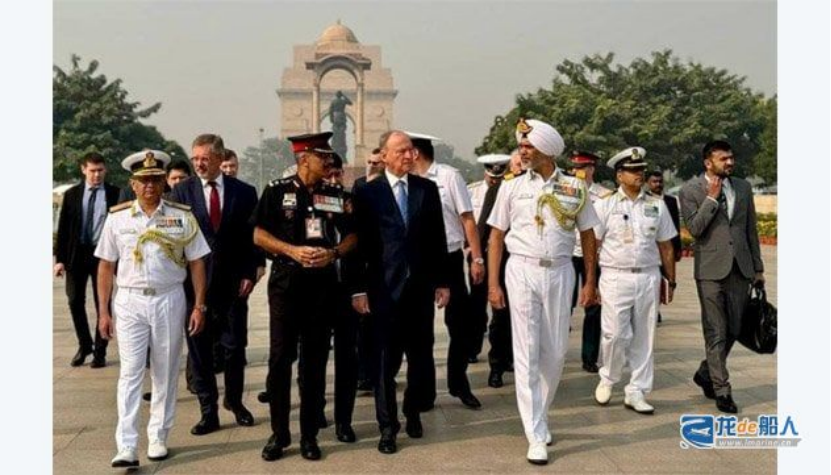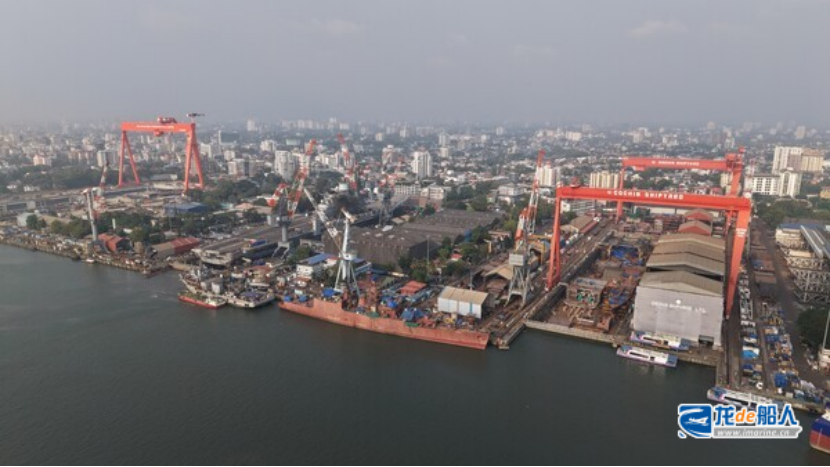Ahead of Russian President Vladimir Putin’s visit to India in December, Russian and Indian delegations held talks in India. The two delegations discussed several potential cooperation topics. Reports indicate that Russia is proposing to assist India in developing its shipbuilding industry. Currently, the Indian government has formulated proactive investment plans and policies aimed at supporting the development of the shipbuilding and shipping industries.

Russian Foreign Minister Sergey Lavrov led a delegation to India to prepare for the meeting between Russian President Vladimir Putin and Indian Prime Minister Narendra Modi, holding consultations on issues of mutual concern. The Russian Embassy in India stated: “This marks the sixth meeting this year, underscoring the special priority status of the Russia-India strategic partnership.”
Nikolai Patrushev, Presidential Aide and Chairman of the Russian Maritime Council, served as a key participant in the talks. He met with India’s National Security Advisor, Maritime Security Coordinator, Minister of Ports, Shipping and Waterways, and representatives of the Indian Navy, and was received by Indian Prime Minister Narendra Modi. It is reported that during the discussions, both sides “emphasized their shared commitment to deepening Russia-India cooperation and strengthening maritime capabilities.”
According to an official report from the Russian Maritime Committee’s press office, Russia has proposed establishing shipbuilding and ship repair bases within the industrial clusters planned for Mumbai and Chennai. The Russian side expressed willingness to assist India in achieving its “green shipbuilding” objectives and to provide support in multiple areas including crew training and scientific research related to marine exploration.
The report stated that Nikolai Patrushev told Indian officials in New Delhi: “Russia can offer India many innovative solutions in the shipbuilding field, including designs for existing or newly developed fishing vessels, passenger ships, and auxiliary vessels. Russia has extensive experience in building specialized vessels—such as ice-class vessels and icebreakers.”
According to the Russian Maritime Board, Russian officials emphasized opportunities for strengthening bilateral cooperation in civil maritime transport, covering shipbuilding, port infrastructure, and maritime logistics. Russia also proposed initiatives such as establishing relevant databases to “significantly reduce the cost of renewing India’s fleet.”
To reduce its dependence on foreign shipyards and shipowners, India is vigorously developing its shipbuilding industry and has formulated policies to support the development of its merchant fleet, while also calling for India to become a world-class shipbuilding power. In this context, India welcomes the exchange of views between India and Russia on strengthening connectivity, shipbuilding, and the blue economy, and looks forward to hosting President Putin. The relevant agreements are expected to be finalized during the December meeting.

It is noteworthy that in recent years, Russia and India have gradually deepened their cooperation in the shipbuilding industry.
In 2023, a Russian shipowner announced an order for 24 cargo vessels with India’s state-owned Goa Shipyard, scheduled for delivery in 2027. The newbuilds would be deployed on routes in the Caspian Sea region. According to reports at the time, the first phase of the order was placed by a Russian-registered subsidiary of Iran’s state-owned shipping company, Islamic Republic of Iran Shipping Lines (IRISL).
In 2024, Russia was reported to be spending over $700 million to commission four non-nuclear icebreakers from two Indian shipyards. Upon delivery, these vessels will join Rosatom’s icebreaker fleet for operations along the Northern Sea Route (NSR). Earlier this year, reports indicated that India’s Cochin Shipyard and Pipavav Shipyard were engaged in advanced negotiations with Russia regarding the four non-nuclear icebreakers. However, no further substantive details about the order have been disclosed since then.
Beyond Russia, India is expanding its “circle of friends” with a focus on developing its shipbuilding and maritime industries. Domestic shipyards are advancing collaborations with globally leading shipbuilders and striving to secure international orders. For instance, Cochin Shipyard has signed a shipbuilding cooperation agreement with South Korea’s largest shipbuilding group, HD Hyundai, and secured a letter of intent for six feeder container vessels from French shipping giant CMA CGM. Pipavav Shipyard has received a letter of intent for up to 12 IMO II-compliant chemical tankers from a Norwegian shipowner.
Currently, India has set a goal to become one of the world’s top ten shipbuilding nations by 2030 and among the top five by 2047. Data from global market research firm Ken Research shows that India’s shipbuilding and repair market was worth approximately $90 million in 2022, expanding to $1.12 billion by 2024, a more than 12-fold increase, and is projected to maintain an average annual growth rate of over 60% until 2033.
However, despite the rapid growth of India’s shipbuilding industry in recent years, its share of the global shipbuilding market remains only about 1%, ranking 16th worldwide. Compared to the current top three shipbuilding powers—China, South Korea, and Japan—India’s shipbuilding industry is still in its infancy.


